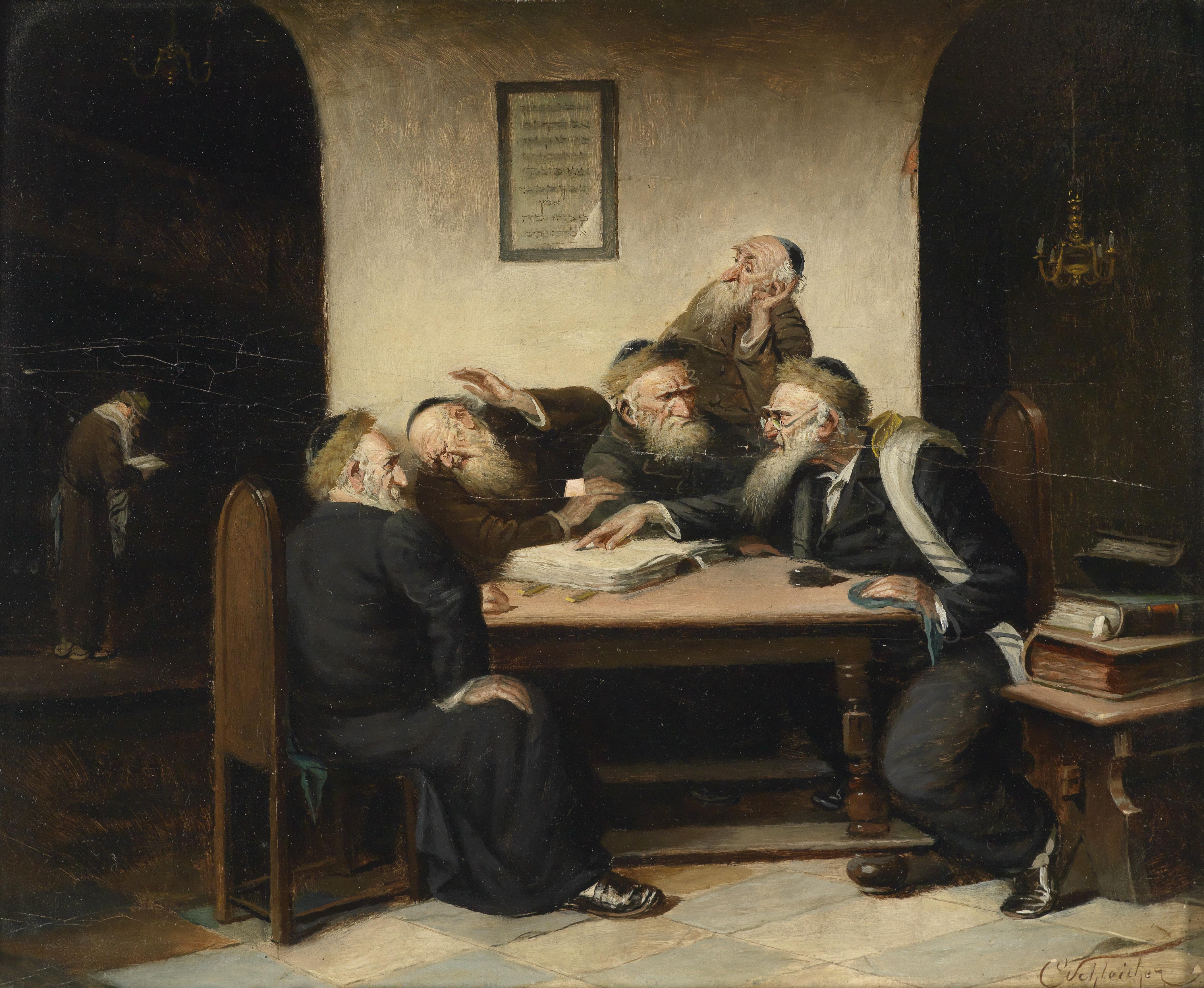|
Lithuanian Hasidism
Hasidic Judaism in Lithuania is the history of Hasidic Judaism and Hasidic philosophy in Lithuania and parts of modern-day Belarus. Hasidic Judaism in Lithuania began with R. Aaron Perlow of Karlin ( Karalin) (1736–1772), R. Menachem Mendel of Vitebsk (1730?–1788) R. Shneur Zalman of Liadi ( Lyady) (1745–1812) and to a lesser extent R. Hayim Haykl of Amdur (Indura) (d. 1787), all of whom were disciples of R. Dov Ber of Mezeritch (Mezhirichi) (c. 1704–1772), who in part was the successor to the R. Israel Baal Shem Tov (c. 1698–1760) who founded Hasidic Judaism in Western Ukraine. In its earliest years, Lithuanian Hasidism suffered immense persecution by the Lithuanian Misnagdic rabbinate, who attempted to ban and excommunicate Hasidism on several occasions in Lithuania beginning with R. Elijah b. Solomon Zalman of Vilna (1720–1797), who was the earliest disseminator of anti-Hasidic thought which flourished in Lithuania. Early history According to Hasidic lo ... [...More Info...] [...Related Items...] OR: [Wikipedia] [Google] [Baidu] |
Vilna Gaon
Elijah ben Solomon Zalman, ( he , ר' אליהו בן שלמה זלמן ''Rabbi Eliyahu ben Shlomo Zalman'') known as the Vilna Gaon (Yiddish: דער װילנער גאון ''Der Vilner Gaon'', pl, Gaon z Wilna, lt, Vilniaus Gaonas) or Elijah of Vilna, or by his Hebrew acronym HaGra ("HaGaon Rabbenu Eliyahu": "The sage, our teacher, Elijah"; Sialiec, April 23, 1720Vilnius October 9, 1797), was a Lithuanian Jewish Talmudist, halakhist, kabbalist, and the foremost leader of misnagdic (non- hasidic) Jewry of the past few centuries. He is commonly referred to in Hebrew as ''ha-Gaon he-Chasid mi-Vilna'', "the pious genius from Vilnius". Through his annotations and emendations of Talmudic and other texts, he became one of the most familiar and influential figures in rabbinic study since the Middle Ages. He is considered as one of the ''Acharonim'', and by some as one of the ''Rishonim''. Large groups of people, including many ''yeshivas'', uphold the set of Judaism, Jewish customs an ... [...More Info...] [...Related Items...] OR: [Wikipedia] [Google] [Baidu] |
Rabbi Meir
Rabbi Meir ( he, רַבִּי מֵאִיר) was a Jewish sage who lived in the time of the Mishnah. He was considered one of the greatest of the Tannaim of the fourth generation (139-163). He is the third most frequently mentioned sage in the Mishnah. His wife Bruriah is one of the few women cited in the Gemara. Biography He was born in Asia Minor. According to the Talmud, his father was a descendant of the Roman Emperor Nero who, it is said, escaped death at the time of his deposition and became subsequently a convert to Judaism. Twenty four thousand students of Rabbi Akiva died in a plague. He went and found five new students and Rabbi Meir was one of them. The four others were: Rabbis Judah ben Ilai, Eleazar ben Shammua, Jose ben Halafta, and Shimon bar Yochai. Meir began to study very early in life. At first he entered the school of Rabbi Akiva, but, finding himself not sufficiently prepared to grasp the lectures of that great master, he went to the school of Rabbi Ishmael, ... [...More Info...] [...Related Items...] OR: [Wikipedia] [Google] [Baidu] |
Torah Study
Torah study is the study of the Torah, Hebrew Bible, Talmud, responsa, rabbinic literature, and similar works, all of which are Judaism's Sifrei kodesh, religious texts. According to Rabbinic Judaism, the study is done for the purpose of the ''mitzvah'' ("commandment") of Torah study itself. This practice is present to an extent in all religious branches of Judaism, and is considered of paramount importance among religious Jews. Torah study has evolved over the generations, as lifestyles changed and also as new texts were written. Traditional view In rabbinic literature, a heavy emphasis is placed on Torah study for Jews, Jewish males, with women being exempt. This literature teaches an eagerness for such study and a thirst for knowledge that expands beyond the text of the Tanakh to the entire Oral Torah. Some examples of traditional religious teachings: * The study of Torah is "equal to all" of the ''Mitzvah, mitzvot'' of Honour thy father and thy mother, honouring one's pare ... [...More Info...] [...Related Items...] OR: [Wikipedia] [Google] [Baidu] |
Ohel Of Chaim Chaykl Of Amdur , Shanghai
{{Disambiguation ...
Ohel may refer to: *Ohel (social services), a children's home and family services organization in New York *Ohel (biblical figure), the son of Zerubbabel, mentioned in I Chronicles *Ohel (Chabad-Lubavitch), burial place of the sixth and seventh Lubavitcher Rebbes *Ohel (grave), a structure built over the graves of Rebbes, prophets and tzaddikim * Ohel Theater, an Israeli theater company, active 1925–1969 See also *Ohel Leah Synagogue, Hong Kong *Ohel Rachel Synagogue The Ohel Rachel Synagogue (Hebrew for "Tent of Rachel") is a Sephardi synagogue in Shanghai, China. Built by Sir Jacob Elias Sassoon in memory of his wife Rachel, it was completed in 1920 and consecrated in 1921. Ohel Rachel is the largest ... [...More Info...] [...Related Items...] OR: [Wikipedia] [Google] [Baidu] |
Slonim
Slonim ( be, Сло́нім, russian: Сло́ним, lt, Slanimas, lv, Sloņima, pl, Słonim, yi, סלאָנים, ''Slonim'') is a city in Grodno Region, Belarus, capital of the Slonimski rajon. It is located at the junction of the Ščara and Isa rivers, southeast of Hrodna. The population in 2015 was 49,739. Etymology and historical names Slonim has been known by several versions of its name: Сло́нім ( Belarusian), Słonim (Polish), Сло́ним (Russian). Slonim was first mentioned in chronicles in 1252 as Uslonim and in 1255 as Vslonim. According to one version (which is also considered to be an official one), the name of the city originates from the Slavic word 'zaslona' (a screen), meaning that the city used to be an outpost at the southern border of Grand Duchy of Lithuania. Another version, proposed by Jazep Stabroŭski, states that Slonim is a derivative from 'Užslenimas' in the Lithuanian language simply means 'beyond the valley'. History Middle Ages ... [...More Info...] [...Related Items...] OR: [Wikipedia] [Google] [Baidu] |


.jpg)